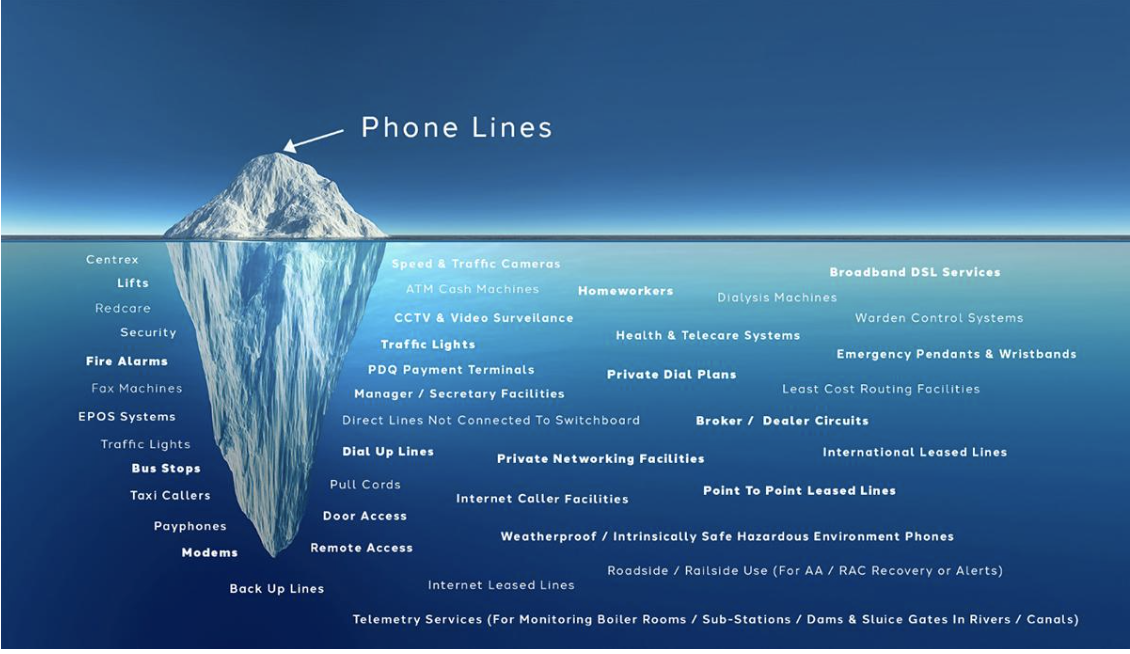PSTN Switch-Off Dates
An announcement made by BT in May gives businesses more time to prepare. Plans were in place to shut down analogue networks by December 2025. However, the Big Switch Off has been extended to 31st January 2027.
The longer timeframe allows businesses and homeowners more time to seek digital alternatives to analogue technology and address issues that may arise during migration. In addition, BT Openreach intends to bring Ultra fast, full fibre broadband to 25 million more residential and commercial properties by the end of 2026.
However, before this drops off your list of actions, we would urge you to stick with the original timeframes. Here are three reasons why:
- The change is happening because the current analogue system is outdated and no longer fit for purpose. A growing number of issues are being reported each year.
- Digital telecoms and devices are more efficient, reliable and lower-cost, which has to be an advantage to your operations.
- The transition requires 7 million switches across the UK. If everyone leaves it until the last minute, there is a risk that it won’t be completed on time and connectivity will be lost.
So, here are the key dates:
- September 15, 2023: End of sales for broadband and phone services using the old copper networks, including ISDN lines.
- By December 2026: BT Openreach will extend ultra fast, full fibre broadband across most parts of the UK
- By January 2027: Mandatory migration period for businesses to transition from ISDN and PSTN lines
- January 2027: Complete shutdown of ISDN and PSTN networks; all services on these networks will cease.
Now is a good time to get informed, understand which of your technologies will be impacted and find viable alternatives. So, pick up the pace to ensure you are fully prepared for the Big Switch Off.
What Does The PSTN Switch-Off Mean For My Business?
The switch-off will affect the majority of businesses and households across the UK. Yet, according to the Switch On to the Switch Off survey from March 2021, 46% of businesses had no clue that their analogue telephony services would be completely defunct in a few years. Three years on and we’d wager that most of the general public are still unaware.
Although the PSTN network provides analogue telephony, the Big Switch-Off will affect far more than your landline phone.
This switch to digital, fibre broadband connectivity will affect any services that rely on the PSTN network. That includes landline phones, ISDN telephony systems, ADSL internet connectivity and more.

This iceberg analogy published on Open Access Government clearly illustrates the implications of the switch-off. Yes, it will affect landline phones, but PSTN is used in multiple products and services.
Do I Need to Upgrade from Standard Fibre Broadband?
Firstly, if your building uses a fibre broadband connection, but it isn’t ‘full-fibre’, then quickstep to an upgrade.
Standard fibre broadband uses high-speed fibre cables to connect your local exchange to the green telecoms box at the bottom of your street. All good so far, however, the connection between that cabinet and your property is still standard copper cable.
To continue using broadband internet, every commercial and residential property needs to upgrade to full-fibre broadband before the PSTN deadline.
Your internet service provider should offer you an upgrade. We’d advise you to set the pace and contact them or shop around. If you’re nearing the end of your business broadband contract, call us on 0333 101 7300 to see if we can provide a competitive, future-proof, full fibre service in your area.
Will Phone Systems Still Work After the Big Switch Off?
To maintain telephone communications with colleagues and clients, you need to check that you use a digital VoIP system. If not, prioritise an upgrade to your systems.
Don’t risk leaving it until the last minute, as many other businesses and households will do just that. That demand will make solutions and engineers harder to find. Equally, planning and executing an upgrade takes time and then your team need training on using the new system.
Look at it this way. If you’re still relying on an outdated phone system, this is a great opportunity to upgrade to a modern, flexible VoIP solution.
Can Our Business Take Payments After the Big Switch Off?
It’s important to know if your payment terminals are reliant on analogue lines.
That includes card readers, EPOS Point of Sale machines, barcode scanners and other payment processing systems. If they are, it is time to upgrade your technology.
Are Security Systems & Alarms Impacted by the Big Switch Off?
Some managed security and alarm systems use analogue telephony to communicate with security monitoring centres. This can include CCTV, intruder alarms, and fire monitoring systems.
If yours is one of them, it needs to be replaced with a digital option before the cut-off to avoid disruption. Systems that have been installed in the past few years are likely to be digital already but check in with your provider. At the same time, enquire about access control and intercom systems because you don’t want to be locked out of your premises!
It is unlikely that lone worker alarms or monitors will be affected as most operate using GSM or GPS technology. However, there has been concern over personal “telecare” alarms which support around 1.8 million older people and people with disabilities to live independently. If you operate in the care industry or know a telecare user and have concerns, contact Digital Voice for advice on 0330 1234 150.
Does IoT & Industrial Monitoring Technology Use PSTN?
Internet of Things and Industrial Control Systems span numerous devices. It’s impossible to discuss how the PSTN switch-off will affect every IoT/SCADA device.
From factory-floor industrial control systems, remote sensors out in the field, automatic conveyor belts, and robotic actuators, to smart watches and voice-operated speakers our advice is the same. Firstly, establish how each IoT device connects and flag those that rely on analogue connectivity.
Then, explore specific options by speaking to your provider or independent connectivity partners. Depending on the tech, it may be as simple as switching to a mobile SIM.
However, when digitising your analogue IoT estate, you may be missing a trick if you simply replace like-for-like functionality. Instead, use this opportunity to gather more data, increase control and enhance the scale of your IoT operations.
Does Your Business Use Franking & Fax Machines?
If your organisation relies on a mailroom with a franking machine, it’s another check.
Generally, digital machines connect to your network through Ethernet or Wi-Fi, meaning they won’t be impacted by the PSTN switch-off. However, analogue franking machines use landline connectivity to receive price updates. So, if mail is still a big part of your business, ask your franking provider about changing to a digital device.
As for fax machines, it’s game over. The UK Government recently voted to remove telephony providers’ obligations to provide facsimile services. That’s likely because of the low take-up and because fax technology relies on analogue copper-line telephony.
However, if you do business abroad, be aware that not all countries are on the same page about fax machines. 43% of companies use faxes in Germany and it’s seen as an essential communication method in Japan. North America seems to be a growing market for fax services, too.
If you want post-switch-off options, Fax over IP (FoIP) and email-to-fax are available. Communicate with your fax provider and fax-loving contacts abroad to come up with a suitable plan of action.
What About BT Redcare Security Service?
It’s also worth noting that BT Redcare is ending in August 2025. Therefore, you may want to consider the implications alongside your wider ‘big switch’ plans. We’ll put together further information on this, including alternative solutions in the coming months.
Understanding VoIP solutions
We appreciate that it’s overwhelming when you see the impact of the Big Switch Off on business operations. And, it can be difficult to know where to start with the leap to VoIP solutions. Be assured that Flex IT can advise you about any services affected by the Big Switch-Off.
Yes, it will cause a few headaches, yet, this is an essential move to futureproof the UK’s communication and operational systems. You might see it as an opportunity to adopt technologies like full-fibre broadband and VoIP solutions, which enhance operational efficiency and client satisfaction.
Our recent article on the Rise of Internet Telephony VoIP explains VoIP, including:
- How VoIP works
- The main advantages and disadvantages of VoIP
- Why VoIP is popular
We will only recommend solutions that are appropriate for future-proofing your business. No unnecessary functionality, complexity or charges. We want to encourage you to take action to ensure business continuity.
The Risk of Inaction
The PSTN switch-off isn’t just something that you can ignore or opt out of. It’s happening to us all, and we all need to be prepared. Ready or not, the copper network will be switched off at the end of this year and any analogue connectivity will go with it. And, some telephony providers may even hit the “off” button sooner.
This change will be disruptive for some organisations, so we recommend being proactive. The sooner you act, the sooner you will be able to benefit from future-focused technologies like full-fibre broadband and VoIP-driven Unified Communications, which make your operations more efficient. And, the more efficient you are, the happier your clients will be!
